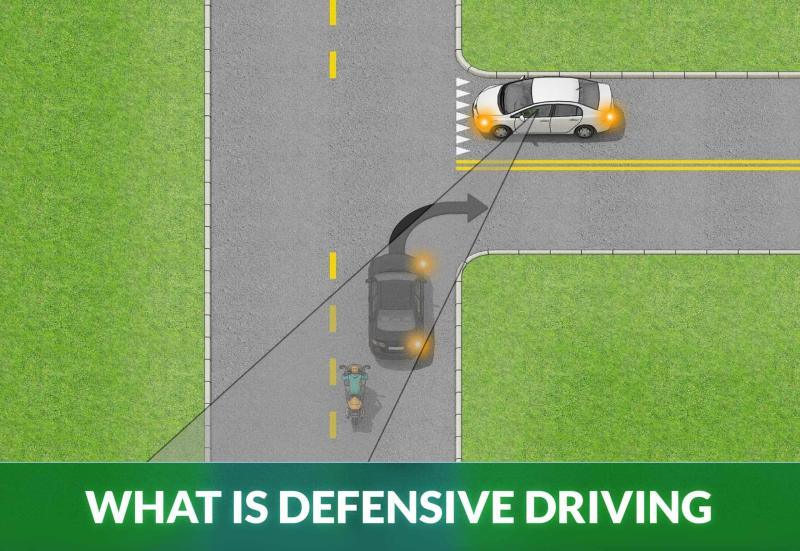What is defensive driving and should you do it?
Defensive driving is a set of skills and practices that help drivers anticipate and respond effectively to potential hazards on the road. The primary goal of defensive driving is to reduce the risk of accidents and promote safe driving behavior. This approach emphasizes proactive strategies to avoid collisions and handle challenging situations on the road.
Key aspects of defensive driving include:
Awareness: Defensive drivers remain alert and aware of their surroundings at all times. This involves scanning the road ahead, checking mirrors regularly, and staying conscious of the actions of other drivers.
Anticipation: Defensive drivers anticipate potential hazards and plan their actions accordingly. This includes predicting the movements of other vehicles, pedestrians, and potential road obstacles.
Safety Cushion: Defensive driving involves maintaining a safety cushion around your vehicle. This means leaving enough space between your vehicle and others to allow for safe stopping distances and maneuverability.
Adaptability: Defensive drivers are adaptable and ready to respond to changing road conditions, weather, and traffic situations. They adjust their speed and driving behavior based on the circumstances.
Avoidance Techniques: Defensive driving teaches techniques to avoid collisions, such as evasive maneuvers, proper braking, and steering techniques. The goal is to minimize the impact of potential dangers.
Knowledge of Traffic Laws: Defensive drivers have a thorough understanding of traffic laws and regulations. Adhering to these rules helps create a safer driving environment for everyone on the road.
The importance of defensive driving can't be overstated. Here are some reasons why it is crucial:
Safety: Defensive driving significantly reduces the risk of accidents and enhances overall road safety. It helps drivers make better decisions, especially in critical situations.
Reduced Collisions: By being proactive and alert, defensive drivers are less likely to be involved in collisions. This can lead to lower personal injury risk, vehicle damage, and associated costs.
Lower Insurance Premiums: Many insurance companies offer discounts to drivers who complete defensive driving courses. This can result in lower insurance premiums, making it a cost-effective investment.
Legal Benefits: In some cases, completing a defensive driving course may allow drivers to dismiss a traffic ticket or reduce the associated penalties.
Personal Confidence: Defensive driving courses not only impart valuable skills but also boost a driver's confidence. Feeling more in control on the road can make driving a less stressful experience.
Whether you are a new driver or have years of experience, incorporating defensive driving techniques into your habits is advisable. Defensive driving courses are available in many areas, and they can provide additional insights and skills to help you become a safer and more responsible driver.
What defines defensive driving, and why is it considered important?
Defensive driving can be defined as a set of skills and practices that drivers use to anticipate and avoid potential hazards on the road. It's about being proactive and taking responsibility for your own safety, as well as the safety of others around you.
Here are some key principles of defensive driving:
- Staying alert and aware of your surroundings: This includes scanning the road ahead and to the sides, checking your mirrors frequently, and being mindful of other drivers, pedestrians, and cyclists.
- Maintaining a safe following distance: Allow enough space between your vehicle and the one in front of you to react safely to sudden stops or changes in traffic flow.
- Using appropriate speed: Always drive within the posted speed limit and adjust your speed based on weather conditions, traffic volume, and road visibility.
- Communicating clearly with other drivers: Use your turn signals to indicate your intentions and avoid making sudden or erratic maneuvers.
- Avoiding distractions: Put away your phone and other distractions while driving, and focus on the task at hand.
Defensive driving is important for several reasons:
- It reduces the risk of accidents: By anticipating and avoiding potential hazards, defensive drivers are less likely to be involved in crashes.
- It saves lives: Every year, thousands of lives are lost in traffic accidents. Defensive driving can help to prevent these tragedies.
- It reduces injuries: Even minor accidents can result in serious injuries. Defensive driving can help to prevent both minor and major injuries.
- It saves money: Traffic accidents can be expensive, both in terms of repair costs and medical bills. Defensive driving can help to save you money in the long run.
- It promotes a safer driving culture: When everyone practices defensive driving, it creates a safer environment for all road users.
Here's an image depicting a driver practicing defensive driving:
In addition to the benefits listed above, defensive driving can also help to reduce stress and anxiety while driving. By being prepared for the unexpected, you can feel more confident and relaxed behind the wheel.
If you're interested in learning more about defensive driving, there are many resources available online and in your community. You can also take a defensive driving course, which can be a great way to learn the skills and strategies you need to become a safer driver.













